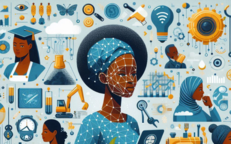Exploring Blockchain-Enabled Technologies To Strengthen Africa's Continental-Wide Trade Systems

This is the 15th post in a blog series to be published in 2022 by the Secretariat on behalf of the AU High-Level Panel on Emerging Technologies (APET) and the Calestous Juma Executive Dialogues (CJED)
The African Union's 18th Ordinary Session of the Assembly of Heads of States and Governments (January 2012) adopted the establishment of the African Continental Free Trade Area (AfCFTA). In addition, the summit endorsed the Action Plan on Boosting Intra-Africa Trade (BIAT), aimed at improving trade policy, trade facilitation, productive capacity, trade-related infrastructure, trade finance, trade information, and factor market integration.[1] Primarily, these frameworks bolster intra-African trade by enhancing extensive and mutually advantageous trading possibilities for exporters and importers within and between African Union Member States. This is anticipated to increase and expand Africa's intra-continental trade and partnerships.
AfCFTA seeks to connect approximately 1.3 billion people across 55 African countries with a combined gross domestic product (GDP) valued at approximately US$3.4 trillion.[2] This agreement covers the trade of goods, services, investments, intellectual property rights, and competition policy among African countries.[3] Therefore, AfCFTA presents a significant potential for African countries to elevate approximately 30 million people from severe poverty because of access to the African markets. Furthermore, this can improve the remuneration of a further 68 million people living below $5.50 per day. Hence, it is envisaged that implementing AfCFTA is potentially transforming African markets and the continent's socio-economic development and growth. This can, in turn, boost production, manufacturing, and value addition to the continent's natural resources.
Despite the potential of the trade agreement to enhance the implementation of the African Union Agenda 2063 and Africa's industrialisation aspirations through effective exports and imports, AfCFTA faces several impediments. Unfortunately, these hurdles may derail the effective implementation of the trade agreement. For example, there is a limited infrastructural capacity to manage the trade agreement across the continent. As such, these trade ineptitudes are derailing and impeding essential components of trade such as acquiring and processing trade support documents, accessing trade information, and financing across African Union Member States.
Regional and continental integration can effectively enable Africa's digital economy expansion to improve connectivity, data accessibility, and innovation. Since African countries are historically fragmented in trade, participation, and movement, there is a need to consolidate the trade systems to improve collaboration and partnerships. Therefore, to successfully implement AfCFTA, African countries are being challenged to invest in technologies such as broadband connectivity, e-commerce, integrated payment systems, and integrated digital identity systems.[4] However, underlying technologies such as blockchain, big data, and artificial intelligence can enable these operational technologies. As such, these underlying and innovative technologies such as blockchain can significantly benefit AfCFTA by enhancing trade applications such as customs procedures, certification processes, transportation, logistical applications, and insurance management, among others.
For instance, blockchain technology can introduce distributed ledger technology (DLT) instead of relying on the inefficient paper-based management system. The DLT refers to the protocols and supporting infrastructure that enables computers in various locations to propose and validate transactions and further update records in a synchronised manner across the network.[5] Fundamentally, the DLT can enable and improve verification processes, further reducing the cost of doing business in Africa.[6] This is because the DLT system operates as a distributed database ledger that can be shared among various computer nodes. This enables the storage of electronic data in a digital format. The DLT system also contains the capacity to maintain a secure and decentralised record of transactions in an immutable digital ledger. Essentially, the DLT system can securely store information such as one cannot alter, hack, or trick the system. However, this information can be written and viewed by anybody, even though it cannot be deleted.
The African Union High Level Panel on Emerging Technologies (APET) believes that implementing blockchain-enabled technologies can securely accelerate and improve the free trade area's administration of border procedures and national single windows. These national single windows can be utilised as a point of entry through which African traders can submit their documentation and information to complete their customs procedures. Therefore, blockchain-enabled technologies can strengthen African countries' national single windows and border procedures. In this way, African countries can utilise blockchain technologies to create efficient and transparent data management systems and secure and accurate trading data.
Furthermore, the inherent qualities and features of the DLT systems facilitate business-to-government (B2G) and government-to-government (G2G) processes at the national and regional levels.[7] Furthermore, blockchain technology is also optimising the processes of goods identification, guaranteeing secure payments and financing, enabling the verification of digital origin certifications, and allowing real-time sharing of information at different trade stages. In this case, blockchain technology is facilitating trade and enhancing safety, security, and fair revenue collection. In addition, blockchain-supported technologies are enabled by other emerging technologies such as the internet of things, data analytics, and artificial intelligence to operate effectively and efficiently.
APET proposes that African countries should digitise their trade systems to completely benefit from blockchain-enabled AfCFTA systems. Thus, adopting innovative solutions such as blockchain technology can make trading easier since all the security processes are linked to a single technological and operational system.
For instance, through the DLT systems, small-to-medium scale farmers and other upstream participants, particularly the unbanked businesses, can access funding and investment instruments to establish equitable supply chains.[8] Fundamentally, these businesses can utilise the mobile banking technology supported by blockchain and artificial intelligence technology to provide digital identities. These digital identities can provide African businesses with reliable transactional histories and reduce banking risks while expanding access to finance.[9]
Therefore, APET encourages African governments to significantly invest in digital infrastructure to expand blockchain-related solutions and opportunities. APET also encourages African countries to standardise their interoperable planning of blockchain systems into current or upgraded systems. This can ensure that the emerging blockchain technologies are integrated and remain compatible with African trading and customs systems.
African countries such as Ghana have adopted blockchain technologies to enhance their trading activities and increase operational systems' interoperability. To this end, Ghana's Central Bank has established a regulatory sandbox to enable banking institutions, businesses, and government agencies to develop and test their innovative blockchain-based solutions for merchant payments and remittances systems.[10] This platform effectively addresses the interoperability challenge of the various systems and enhances the compatibility of systems.[11] In addition, ensuring the blockchain technology's interoperability can enable adequate streamlining through standards across sectors and industries. This can also improve the capacity for businesses to utilise blockchains in a timely industry-wide standard system.
One of the solutions blockchain technology offers is addressing the challenge of land ownership and disputes. For example, more than 80% of landowners in Ghana have limited official title deeds with the Land Commission of Ghana. Most of the land is customarily held through oral agreements.[12] As a result, the Ghanaian start-up Bitland is addressing this by using blockchain technology to establish and digitalise official title deeds. This enhances the integrity of the land records to support the Land Commission of Ghana.[13] After their land has been clearly captured and registered using the DLT systems, the landowners may subsequently apply for loan and mortgage instruments with their respective banking institutions.[14]
Furthermore, the Land Layby Group, a Kenyan real estate company based in Nairobi, allows individuals to acquire property in Ghana securely.[15] This is accomplished by accurately mirroring the Government Land Registry systems in the blockchain network. As a result, the potential land purchasers can effectively review, assess and analyse the accuracy of the ownership records from the Government Land Registry systems on a tamper-proof digital form. The Land Layby Group enables the online publication of blockchain-based land records.[16] Consequently, the threat of multiple land titles for the same piece of land is eradicated and addressed. In addition, a similar business model has been launched by a Ghanaian-based start-up known as BenBen.[17]
APET notes that Africa is swiftly expanding blockchain-related technologies such as cryptocurrency markets among the developing economies.[18] As such, the utilisation of cryptocurrency in the continent has been reported to be the third fastest-growing market globally. Since this technology highlights a model that can be expanded across the continent to improve transferring of money within the AfCFTA systems, for example, M-PESA has transformed financial services by enabling the transfer of money across 30 million users across 10 African nations. For instance, Vodafone reported that M-PESA observed over 6 billion transactions, and the 51 million customers are generating over US$314 billion transactions per year through M-PESA.[19]
Digital Frontiers researchers reported that approximately 200,000 women had been lifted from the low-income and labour-intensive agricultural sector to more prosperous small businesses because of M-PESA.[20] Therefore, APET believes that incorporating systems similar to the blockchain-enabled technological systems such as M-PESA into the intra-continental trade can fast-track transactions within the trading system. Thus, blockchain enables financial inclusion and unlocking transactional participation across African regions.
Yet, to date, blockchain-enabled technologies have remained glaringly underfunded. The African continent represents less than 0.5% of global blockchain funding.[21] However, APET notes that there has been incremental funding for supporting blockchain technologies in Africa. This is demonstrated by the 1,668% increment funding from the 1st quarter of 2022 against the same period in 2021.[22] The rapid growth rate highlights African blockchain start-up enterprises' incremental venture capital funding in 2022 against 2021. For example, venture capital has shown a 149% increment, demonstrating an 11 times growth.[23]
Worth noting that African systems that are negatively impacted by the older legacy systems are struggling with red-tape inefficiencies.[24] Thus, the blockchain and cryptocurrency technologies successfully allow the legacy systems to be circumvented entirely and, in some cases, create the means to diminish the predominant frictions.[25]
Blockchain technology can also be used to address microfinancing and claim insurance providers. Farmers are losing their insurance claims because of bureaucracy in the crop insurance systems. However, blockchain technology solutions are reconciling these challenges through distributed ledgers.[26] For example, a blockchain company called Etherisc is improving crop insurance in Africa and across developing economies. In this case, the company is enabling parametric insurance implementation.[27] As such, Etherisc has successfully provided drought insurance policies to farmers in the fields of Sri Lanka, South Asia, in partnership with Oxfam and Action.[28] Therefore, similar blockchain-enabled approaches and solutions can be pursued in the African context.
The Global Innovation Laboratory for Climate Finance reported that Etherisc's smart contract technology could decrease the necessary policy costs by approximately 41% and render the premiums affordable.[29] This transparent system is also markedly lessening the claim cycles to less than the usual 3 months. Further to this, this system creates transactional confidence because of the automatic claims that are paid out in alignment with the transparent terms and conditions.
APET notes that several technical challenges are impeding the widespread uptake and adoption of blockchain-related technologies across the various economic sectors, including trade. This is crucial because of the magnitude of potential continental transactions within the blockchain-enabled trade systems for African businesses. Thus, African countries should enable scalability to strengthen the transactional capacity that can be executed per time unit, as most blockchain technologies remain limited. African researchers and innovators are encouraged to improve the size limitations of individual new blocks on the chain and the redundancy of previously linked blocks that reduce the transaction processing speed.
Furthermore, African countries should address the privacy concerns associated with blockchain-generated transactions. For example, major public blockchain distributed ledgers can publicly and permanently divulge data and metadata. Several private and permissioned blockchain distributed ledgers can sometimes allow some form of privacy depending on that blockchain consortium. Unfortunately, private and permissioned blockchains may not provide adequate trust and immutability as the system relies substantially on its off-chain governance structure. Thus, both private and public blockchains should strengthen privacy based on the zero-knowledge proofs. APET believes that this is especially crucial for trading systems across African countries.
Most importantly, African countries should improve the infrastructure of the blockchain-based system. Blockchain technology currently relies on the availability of operational and dependable infrastructure, including internet connectivity. Even though some blockchain-enabled technologies may lighten this precondition, infrastructure remains crucial in blockchain technology implementation, especially in Africa.
Furthermore, blockchain technology requires technical characteristics and contextualisation in the real world. Thus, the blockchain systems should specifically have the digital representation of assets, usually referred to as an oracle problem.[30] This means the blockchain data should be digitalised to solve the context-specific traceability of assets in supply chains such as fashion, pharmaceutical drugs, and agricultural goods. In addition, the data quality should ensure data integrity, quality, and accuracy. On the other hand, to enable smart contracts, the automation of blockchain technology can allow for the code to be directly programmed on-chain in their own caveats. Thus, to obtain high-quality software development standards, African countries should integrate blockchain technology within existing system landscapes to enhance technical design choices and compatibility.
In conclusion, APET suggests African countries adopt blockchain technology to strengthen Africa's socio-economic activities. The successful implementation of AfCFTA will tremendously advance Africa's economic growth and render Africa a global trade leader. APET believes African countries can significantly benefit from a decentralised digital ecosystem supported by blockchain technologies.
Featured Bloggers – APET Secretariat
Justina Dugbazah
Barbara Glover
Bhekani Mbuli
Chifundo Kungade
[1] https://au.int/en/ti/cfta/about.
[2] https://www.worldbank.org/en/topic/trade/publication/the-african-continental-free-trade-area.
[3] https://www.nepad.org/blog/continental-free-trade-area-africa-driven-emerging-technologies.
[4] https://news.microsoft.com/en-xm/2021/06/15/the-afcfta-can-change-the-circumstances-of-millions-of-africans-for-the-better-and-technology-is-the-key/#:~:text=A%20major%20factor%20for%20the,data%20and%20AI%20as%20enablers.
[5] What is distributed ledger technology? https://www.bis.org/publ/qtrpdf/r_qt1709y.htm.
[6] https://www.investopedia.com/terms/b/blockchain.asp.
[7] https://www.africaportal.org/features/blockchain-technology-tool-accelerate-free-trade-africa-part-i/.
[8] https://www.un.org/sustainabledevelopment/wp-content/uploads/2022/03/2021-Report.pdf.
[9] Amadou N. R. Sy, Rodolfo Maino, Alexander Massara, Hector Perez-Saiz, and Preya Sharma, FinTech in Sub-Saharan African Countries: A Game Changer? International Monetory Fund, African Department, No. 19/04, 2019.
[10] Rachid Benjelloun, Global Views, Financial technology, Opinion: How blockchain can boost trade in Africa, 29 September 2021. https://www.devex.com/news/opinion-how-blockchain-can-boost-trade-in-africa-101615.
[11] https://101blockchains.com/blockchain-interoperability/.
[12] https://theconversation.com/ghanas-land-acquisition-process-generates-conflict-blockchain-offers-a-solution-165484.
[13] Mintah, Kwabena & Baako, Kingsley & Kavaarpuo, Godwin & Otchere, Gideon Kwame. (2020). Skin lands in Ghana and application of blockchain technology for acquisition and title registration. Journal of Property, Planning and Environmental Law. ahead-of-print. 10.1108/JPPEL-12-2019-0062.
[14] https://www.oecd.org/corruption/integrity-forum/academic-papers/Georg%20Eder-%20Blockchain%20-%20Ghana_verified.pdf.
[15] African startups bet on blockchain to tackle land fraud, By Kevin Mwanza, Henry Wilkins, Thomson Reuters Foundation. https://www.reuters.com/article/us-africa-landrights-blockchain-idUSKCN1G00YK.
[16] Shuaib Mohammed, Hafizah Hassan Noor, Usman Sahnius, Alam Shadab, Bhatia Surbhi, Koundal Deepika, Mashat Arwa, Belay Assaye, 2022, Hindawi, Wireless Communications and Mobile Computing, Identity Model for Blockchain-Based Land Registry System: A Comparison, 1530-8669, https://doi.org/10.1155/2022/5670714.
[17] Ameyaw, P.D.; de Vries, W.T. Toward Smart Land Management: Land Acquisition and the Associated Challenges in Ghana. A Look into a Blockchain Digital Land Registry for Prospects. Land, 2021, 10, 239. https://doi.org/ 10.3390/land10030239
[18] https://www.standardbank.com/static_file/StandardBankGroup/filedownloads/AfricanBlockchainReport.pdf.
[19] https://www.vodafone.com/about-vodafone/what-we-do/consumer-products-and-services/m-pesa.
[20] https://documents1.worldbank.org/curated/en/719111532533639732/pdf/128850-WP-AFR-Digital-Access-The-Future-of-Financial-Inclusion-in-Africa-PUBLIC.pdf.
[21] South Africa fifth in Africa for blockchain funding, CRYPTOCURRENCIES. Lungile Msomi, 24 May 2022. https://techcentral.co.za/south-africa-fifth-in-africa-for-blockchain-funding/211473/.
[22] https://qz.com/africa/2169371/millions-of-dollars-are-rolling-into-africa-to-finance-blokchain-projects/.
[23] EZRA REGUERRA, MAY 23, 2022, Venture funding for African crypto startups grew 11x in 2022: Report. https://cointelegraph.com/news/venture-funding-for-african-crypto-startups-grew-11x-in-2022-report.
[24] Why you need to replace your legacy systems, 1st June 2021. https://businesstech.co.za/news/industry-news/494889/why-you-need-to-replace-your-legacy-systems/.
[25] https://www.wto.org/english/res_e/booksp_e/blockchainrev18_e.pdf.
[26] https://www.fastcompany.com/90735778/can-blockchain-tech-help-farmers-get-climate-insurance.
[27] https://techcrunch.com/2021/10/13/the-importance-of-decentralized-insurance-in-a-destabilizing-climate/.
[28] Aon, Oxfam, and Etherisc launch first blockchain-based agricultural insurance policies for smallholder farmers in Sri Lanka. https://www.bloomberg.com/press-releases/2019-07-01/aon-oxfam-and-etherisc-launch-first-blockchain-based-agricultural-insurance-policies-for-smallholder-farmers-in-sri-lanka.
[29] Op-Ed: Carbon Credits can be Used by Poor Farmers to Get Climate Insurance, Jun 28, 2022. https://www.climatefinancelab.org/news/op-ed-carbon-credits-can-be-used-by-poor-farmers-to-get-climate-insurance/.
[30] Fran Casino, Thomas K. Dasaklis, Constantinos Patsakis, A systematic literature review of blockchain-based applications: Current status, classification and open issues, Telematics and Informatics, 36, 2019, 55-81, ISSN 0736-5853, https://doi.org/10.1016/j.tele.2018.11.006.


